The SSD Anthology: Understanding SSDs and New Drives from OCZ
by Anand Lal Shimpi on March 18, 2009 12:00 AM EST- Posted in
- Storage
PCMark Vantage
Next up is PCMark Vantage, another system-wide performance suite. For those of you who aren’t familiar with PCMark Vantage, it ends up being the most real-world-like hard drive test I can come up with. It runs things like application launches, file searches, web browsing, contacts searching, video playback, photo editing and other completely mundane but real-world tasks. I’ve described the benchmark in great detail before but if you’d like to read up on what it does in particular, take a look at Futuremark’s whitepaper on the benchmark; it’s not perfect, but it’s good enough to be a member of a comprehensive storage benchmark suite. Any performance impacts here would most likely be reflected in the real world.
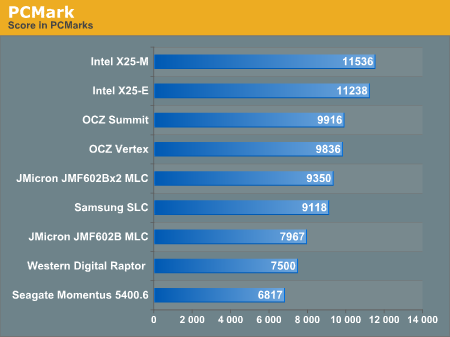
If you've paid attention to the synthetic tests from the previous pages, the results here should make sense. The Intel drives take the top two spots followed by the two OCZ drives, then the JMicron and conventional HDDs take up the rear.
While PCMark does do a great job of measuring disk performance, it doesn't seem to stress random write performance as much, allowing the JMicron drives to relax a bit.
Now let's look at the individual test suites:
The memories suite includes a test involving importing pictures into Windows Photo Gallery and editing them, a fairly benign task that easily falls into the category of being very influenced by disk performance.
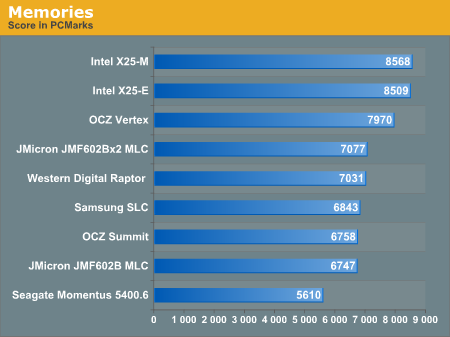
The TV and Movies tests focus on on video transcoding which is mostly CPU bound, but one of the tests involves Windows Media Center which tends to be disk bound.
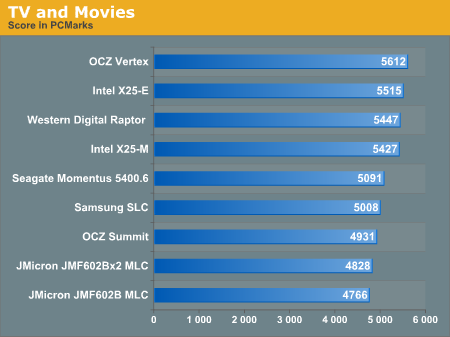
SSDs won't always dominate and in many cases they won't offer tangible improvements over a fast hard drive.
The gaming tests are very well suited to SSDs since they spend a good portion of their time focusing on reading textures and loading level data. All of the SSDs dominate here, but as you'll see later on in my gaming tests the benefits of an SSD really vary depending on the game. Take these results as a best case scenario of what can happen, not the norm.
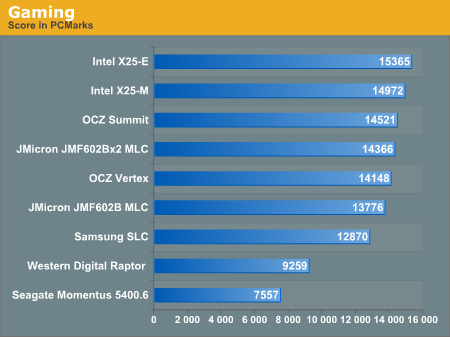
In the Music suite the main test is a multitasking scenario: the test simulates surfing the web in IE7, transcoding an audio file and adding music to Windows Media Player (the most disk intensive portion of the test).
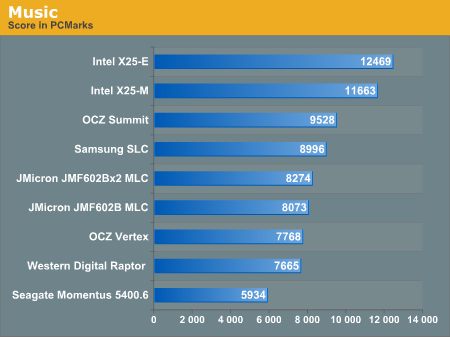
The Communications suite is made up of two tests, both involving light multitasking. The first test simulates data encryption/decryption while running message rules in Windows Mail. The second test simulates web surfing (including opening/closing tabs) in IE7, data decryption and running Windows Defender.

I love PCMark's Productivity test; in this test there are four tasks going on at once, searching through Windows contacts, searching through Windows Mail, browsing multiple webpages in IE7 and loading applications. This is as real world of a scenario as you get and it happens to be representative of one of the most frustrating HDD usage models - trying to do multiple things at once. There's nothing more annoying than trying to launch a simple application while you're doing other things in the background and have the load take seemingly forever.
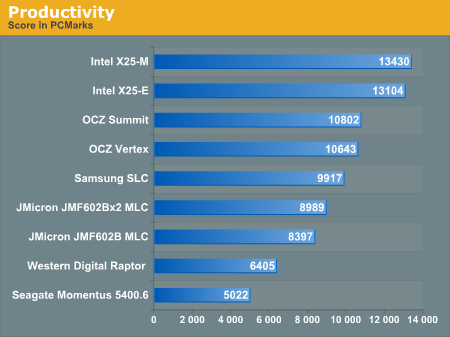
The results here are the best characterization of my personal experience with the drives. The Intel drives are the fastest, a good 25% faster than the Summit or Vertex. Next up are the OCZ drives, with the Vertex dangerously close to the Summit. The older Samsung SLC is next in the standings, followed by the JMicron drives. There's a healthy combination of reads and writes going on here which benefits all of the SSDs, including the less desirable ones.
The final PCMark Vantage suite is HDD specific and this is where you'll see the biggest differences between the drives:
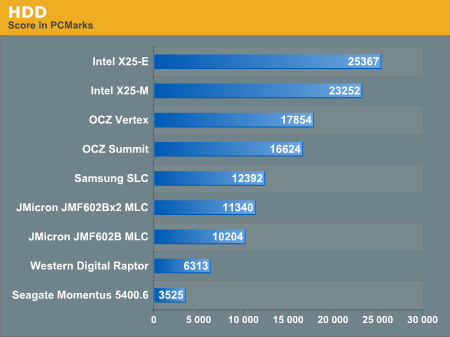
Again we're seeing the sort of breakdown we'd expect. The Intel drives come out ahead, while the Vertex is the best bang for your buck.










250 Comments
View All Comments
Hrel - Thursday, April 9, 2009 - link
although, I have some issues which I have put in an e-mail sent to Anand; can't wait for you response.Hrel - Thursday, April 9, 2009 - link
Instead of making me dinner can you send me that test system instead??? Please!!!Hrel - Thursday, April 9, 2009 - link
I was wondering what controller the OCZ solid Series is based on??? Will I experience hiccups with that drive or not? Is the point of my question.sfisher64 - Wednesday, April 8, 2009 - link
I just purchased a Dell Latitude E6400 with a 64GB Ultra Performance Solid State Drive. Does anyone know what type of drive this is, and where it fits in the spectrum described in this article?Baffo - Saturday, April 11, 2009 - link
The Dells use the Samsung drives (you should see this on the bottom if you pull it out). However, as much as I wish this was one of the newer controllers (I have a few of these at work as well), the testing cycles demanded by Dell probably mean these are the older controllers.marraco - Tuesday, April 7, 2009 - link
This article is popular :)BLHealthy4life - Monday, April 6, 2009 - link
Intel 9.1.1.1010 (Intel) Where are these drivers? I can only find version 1007 and not 1010....Thanks
BLHealthy4life - Sunday, April 12, 2009 - link
found it....Intel obviously keeps the X58 chipset drivers current for their own boards, just not other mfgs boards....
They installed fine on my R2E..
BL
irondukes - Friday, April 3, 2009 - link
Hi-- Do SLCs suffer from performance degradation, or are the controllers pretty agressive at erasing the data since they have far longer read-write cycles? Please help! Deciding between an X25E and X25Mmdavies - Friday, April 3, 2009 - link
I'm reading this about a day late - got my Patriot PE256GS25SSDR 2.5" 256GB yesterday since I'm bad about destroying hard drives. this drive, in a word, was excruciating. I'll be replacing it with one of your recommended drives today.Thanks